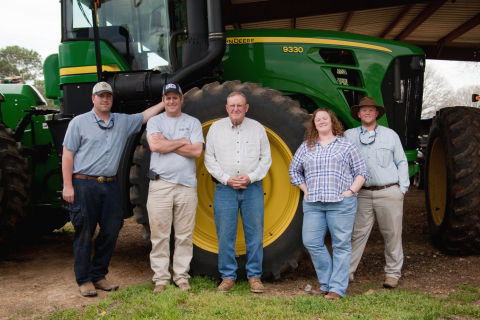Sustainable cotton: Newby family partners with Wrangler
Published 6:45 am Thursday, May 25, 2017

- The Newby family, from left, James Newby, John Newby, Jimmy Newby, Elizabeth Newby Crow and Jerry Allen Newby, will work with Wrangler and advisors from the Soil Health Institute on a new pilot program aimed at improving cotton yields, irrigation, energy inputs, greenhouse gas emissions and soil conservation. The Newby family's cotton — 40,000 pounds — will be used to make a special collection of Wrangler denim jeans that will be sold in 2018.
The Newby family, which includes seven generations of farmers in Limestone County, is now working with Wrangler — one of America’s iconic denim jean brands.
Wrangler, which hopes to build on its long-standing commitment to supporting U.S. farming communities, is launching a pilot program to help U.S. Cotton farmers reach the next level in sustainable growing practices. The knowledge learned in the fields of Limestone County, as well as some of the Newby expertise, will be a part of that program.
Wrangler announced the program Wednesday at the Sustainable Brands conference in Detroit, where the company co-hosted the Good Apparel pavilion.
According to a press release, Wrangler purchases roughly half of the cotton for its products from U.S. growers. The U.S. cotton industry also outperforms most other cotton-growing regions in the world on environmental metrics.
Wrangler, however, wants to determine how even greater environmental and economic benefits can be achieved through a programmatic focus on soil health in the U.S.
“Scientific research shows greater attention to soil health can further reduce the water and energy inputs required to grow cotton and other crops,” said Roian Atwood, Wrangler sustainability director. “We’re working with a cotton grower in Alabama to explore the best way to implement and measure the effects of robust soil practices like no-till, crop rotation and cover cropping. We hope to have dozens of growers in the the program within a few years.”
Newby Farms will work with Wrangler and advisors from the Soil Health Institute to unlock further improvements to cotton yield, irrigation, energy inputs, greenhouse gas emissions and soil conservation.
The Newby’s cotton — 40,000 pounds to be exact — will also be bought and used to make a special collection of Wrangler denim jeans that will be sold in 2018.
“Our family has always looked for new ways to make farming more economical, while taking better care of the land,” Jerry Allen Newby said. “There’s been a learning curve, but we’re beginning to see good results with things like cover crops and soil grid mapping.”
Jerry said the family is happy to work with Wrangler, share what they’ve learned and maybe make it easier for other growers to transition to the practices.
James Newby believes the program is a good way to promote U.S.-grown products, sustainability and conservation techniques.
“It’s important to industry and will be more important as time goes on,” James Newby said. “It’s been a while in the making and we think it will be good for cotton and U.S. farmers as whole.”
Wrangler sustainability
Wrangler’s sustainable work is focused on three areas — land, people and industry. In addition to the cotton pilot project and soil health education, other programs include a commitment to 100 percent renewable electricity by 2025, zero waste facilities and manufacturing and technology improvements that have saved 3 billion liters of water in the last decade.





